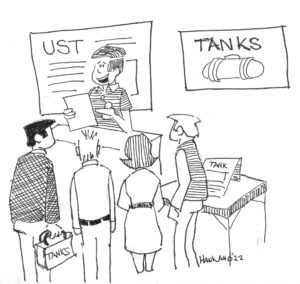Treatment Trains: When One Remedy Isn’t Enough (NTC 2022 Preview)
This session at the National Tanks Conference will feature presentations from three speakers: Tom Fox, Colorado Division of Oil and Public Safety; Geina Skinner, Tennessee Division of Underground Storage Tanks; and Debra Thoma, South Carolina UST Management Division.
Environmental professionals have a “toolbox” of approximately 20 common remedial methods to address LNAPL, but an almost unlimited variety of how and when to employ them. Fox will briefly review these tools and expand our thinking beyond using one technology until it doesn’t work anymore before casting about for the next idea to implement. In fact, multiple strategies may be able to be used in different parts of the plume at the same time. Adaptive site management processes should always be used. But how to decide when enough is enough, and what strategy to employ next? “SMART-ly” setting the proper remedial milestones and endpoints before beginning a remedial journey will help navigate this tricky course.

This session will also include examples of site remediation strategies used in Tennessee and South Carolina.
Skinner will review actions taken by the Tennessee Division of Underground Storage Tanks starting in the spring of 2019 following a suspected release. The initial success of the project was due to a state contractor that had experience with the technologies utilized, multiple staff from across the state providing onsite oversight for activities involving their area of expertise, a single point of contact for all communication internally, and a dedicated liaison for responsible party communication.
Over the past three years, the South Carolina UST Management Division has utilized a combination of soil excavation with oxygen release compound and carbon treatment to remove contaminant mass, dramatically reduce contaminant mass, and bring sites to closure. Thoma will highlight several cases to show the overall effectiveness of this treatment train, the lessons learned, process modifications, and the path forward for future implementation. Information pertaining to the financial aspects of the projects from a cost management perspective as it pertains to the South Carolina fund will also be discussed.
